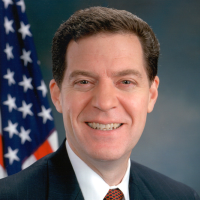Kansas Gov. Brownback Sued for Signing Law Criminalizing the Enforcement of Federal Gun Laws
 Gov. Sam Brownback
Gov. Sam Brownback
You would have thought that the question of “nullification,” that is, the ability of states to ignore federal law, was settled in 1865. But Kansas, which was on the winning side of the battle then, has taken the position that its laws supersede those passed by Congress. Now the state’s bluff is being called in court.
The Brady Center to Prevent Gun Violence is suing (pdf) Kansas Governor Sam Brownback (R), who in 2013 signed into law the “Second Amendment Protection Act.” Under this law, a U.S. government employee attempting to enforce federal regulations for firearms, accessories and ammunition that were manufactured and sold in Kansas could be charged with a felony, according to the Topeka Capital-Journal. The act states that such firearms and accessories are “not subject to any federal law, treaty, federal regulation, or federal executive action, including any federal firearm or ammunition registration program.”
The law also allows those who would be prohibited by federal law from owning firearms to own such “Kansas-only” weapons, allows guns to be manufactured without serial numbers and permits the manufacture of guns designed to fool metal detectors.
“Kansas’ gun nullification law is not just bad public policy, it is patently unconstitutional,” said Jonathan Lowy, director of the Brady Center’s Legal Action Project. “Courts have recognized for years that states cannot just declare ‘null and void’ federal laws they do not like or wish to enforce.
“Just as Southern states were not allowed to opt-out of federal civil rights laws, the constitution does not allow Kansas or any other state to nullify federal gun laws that protect Kansans and all Americans from gun violence,” Lowy said.
When the law was passed, Attorney General Eric Holder wrote Brownback, warning that it was unconstitutional. “In purporting to override federal law and to criminalize the official acts of federal officers, S.B. 102 directly conflicts with federal law and is therefore unconstitutional,” Holder wrote according to the suit.
It appears that for some state officials, there might be a profit motive in their support for the law. Kansas Secretary of State Kris Kobach has an interest in a firearms company in Overland Park, Kansas, that intends to manufacturer a gun similar to the AR-15. That was the type of weapon used in massacres in Aurora, Colorado, and Newtown, Connecticut.
-Steve Straehley
To Learn More:
Brady Center Sues To Block ‘Nullification’ Gun Law in Kansas (by Tim Carpenter, Topeka Capital-Journal)
Brady Campaign Sues Kansas Over ‘2nd Amendment Protection Act’ (by Joe Harris, Courthouse News Service)
Brady Campaign Vs. Brownback and Schmidt (pdf)
Republican-Led State Governments Revive Pre-Civil War Nullification (by Aaron Wallechinsky and Noel Brinkerhoff, AllGov)
- Top Stories
- Unusual News
- Where is the Money Going?
- Controversies
- U.S. and the World
- Appointments and Resignations
- Latest News
- Trump Orders ICE and Border Patrol to Kill More Protestors
- Trump Renames National Football League National Trump League
- Trump to Stop Deportations If…
- Trump Denounces World Series
- What If China Invaded the United States?






Comments